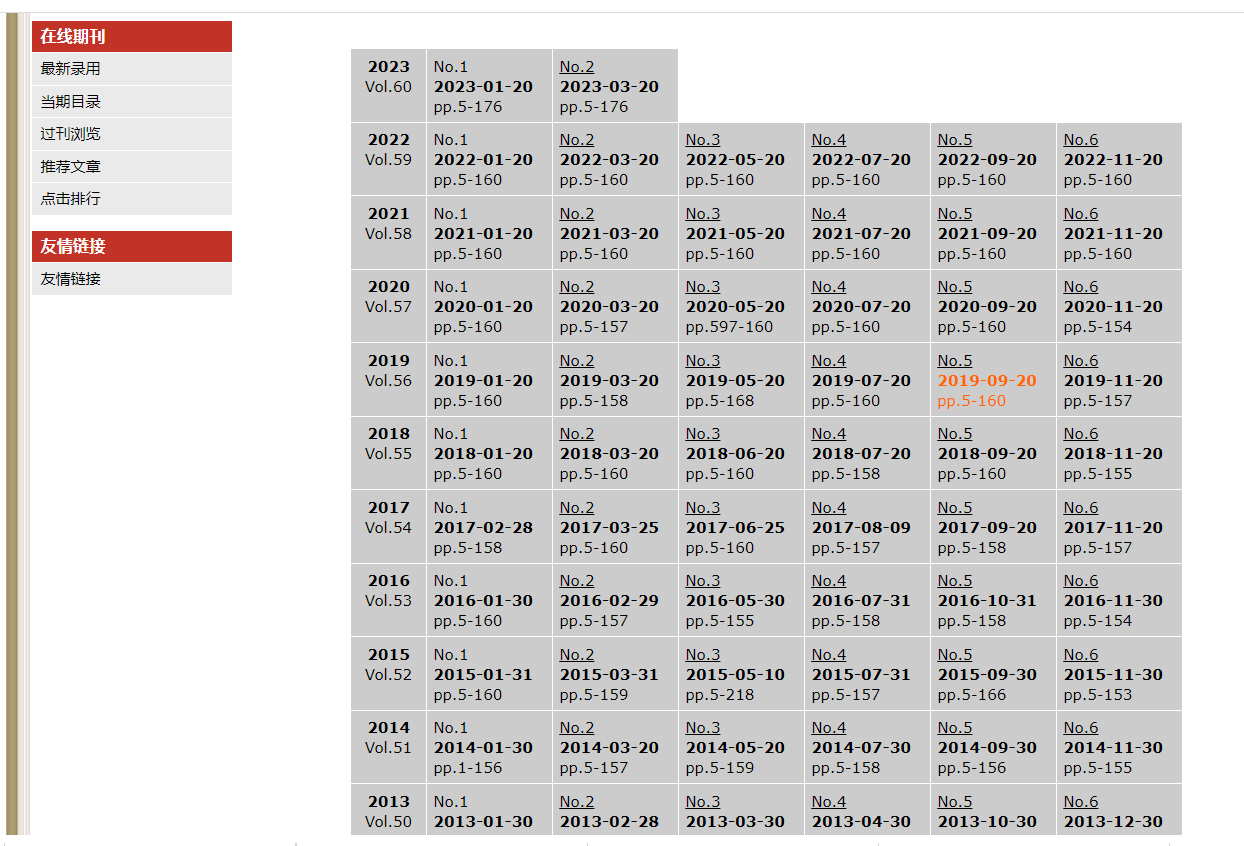背景
最近,在爬取关于国内985大学的学报时,我注意到大部分大学学报站点格式都采用相似的形式,并且PDF链接都使用自增的ID。然而,我也发现了一个问题,即大多数PDF链接的ID并不是连续的。现在我将向你分享一些方法,以快速获取所有的大学学报PDF链接。
首先通过最新期刊和最旧的期刊查找pdf链接的id范围:
最新期刊为 2023-03-20
最旧期刊为 2013-01-30

点击进去后下载pdf后,在开发者工具可以发现链接上的id最大在1000左右,最小的id在个位数。
当我们请求不存在的id会发现response.headers.get(‘Content-Type’)为html类型,而正确的id响应类型则为application/x-download。
response = session.get(
f'http://journal.pku.edu.cn/CN/article/downloadArticleFile.do?attachType=PDF&id=105', #id为105,不正确的id
cookies=cookies,
headers=headers,
verify=False)
print(response.headers.get('Content-Type') )
输出:
text/html;charset=UTF-8
response = session.get(
f'http://journal.pku.edu.cn/CN/article/downloadArticleFile.do?attachType=PDF&id=1',
cookies=cookies,
headers=headers,
stream=True, verify=False)
print(response.headers.get('Content-Type') )
输出:
application/x-download
如果使用head请求虽然可以快速获取所有响应类型,而无需请求响应体。但这里如果你发现使用requests.head方法返回的headers和使用requests.get方法返回的headers不一致,那可能是由于服务器对不同类型请求返回的header信息不同导致的。
我们可以通过覆盖爬取获取每个刊期不同链接上的id,但需要写一堆xpath或正则,所有这里不使用这个方法。
快速爬取pdf链接
我们可以使用request的stream=True方法快速请求url获取pdf链接
在requests库中,stream参数用于控制响应是否以流的方式进行处理。默认情况下,stream参数的值为False,表示禁用流式处理,整个响应内容会一次性加载到内存中。
当stream参数设置为True时,表示启用流式处理,响应内容会以流的形式逐步传输,而不是一次性加载到内存中。这在处理大型响应体或需要逐步处理数据的情况下很有用。
当stream为True时,可以使用close方法关闭请求,就不需要进行请求响应体,可以节省更多资源和时间去请求其他url
完整代码:
import requests,time
from requests.adapters import HTTPAdapter, Retry
import threading
url_id = []
def get_response(id):
cookies = {
'JSESSIONID': '1EEC758D35D23CE4721E1419871575C6',}
headers = {
'Accept': 'text/html,application/xhtml+xml,application/xml;q=0.9,image/avif,image/webp,image/apng,*/*;q=0.8,application/signed-exchange;v=b3;q=0.7',
'Accept-Language': 'zh-CN,zh;q=0.9,ja;q=0.8',
'Connection': 'keep-alive',
'Range': 'bytes=0-0.1' ,
# 'Cookie': 'JSESSIONID=1EEC758D35D23CE4721E1419871575C6',
'Referer': 'http://journal.pku.edu.cn/CN/abstract/abstract1015.shtml',
'Upgrade-Insecure-Requests': '1',
'User-Agent': 'Mozilla/5.0 (Windows NT 10.0; Win64; x64) AppleWebKit/537.36 (KHTML, like Gecko) Chrome/112.0.0.0 Safari/537.36',
}
session = requests.Session()
retries = Retry(total=3, backoff_factor=0.5, status_forcelist=[500, 502, 503, 504])
session.mount('http://', HTTPAdapter(max_retries=retries))
response = session.get(
f'http://journal.pku.edu.cn/CN/article/downloadArticleFile.do?attachType=PDF&id={
id}',
cookies=cookies,
headers=headers,
stream=True, verify=False)
if response.headers.get('Content-Type') == 'application/x-download':
response.close
url_id.append(id)
else:
print('无效id-------',id,response.headers.get('Content-Type'))
return response.headers.get('Content-Type')
threads = []
for i in range(2000):
thread = threading.Thread(target=get_response, args=(i,))
thread.start()
threads.append(thread)
for td in threads:
td.join()
输出:

通过输出可以发现id不是连续的,并且代码运行耗时1分半钟,速度也比直接get请求不使用stream=True快出几十倍。
通过请求上述代码中的url_id 列表里的有效id,我们就可以直接下载pdf了。这个站点pdf数据不多,但国内大学站点大部分都可以采用这种形式爬取。